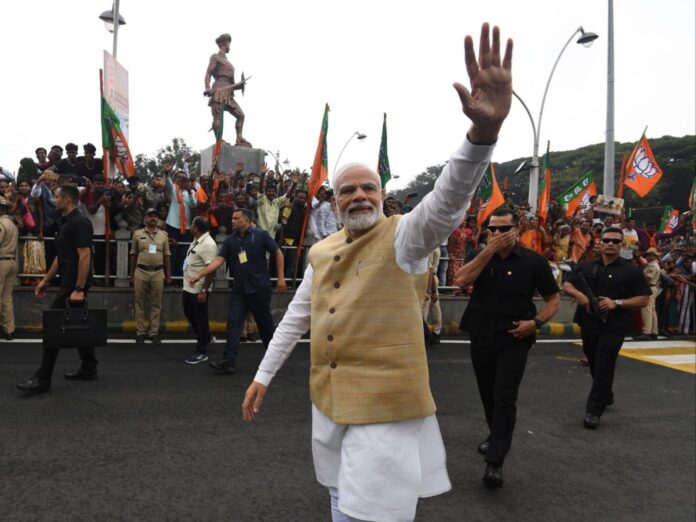Despite its national success, the BJP has struggled to make significant headway in the Dravidian heartland and the picturesque coastal state
Piyush Gautam
Since 2014, the political landscape of India has been significantly altered by the sweeping successes of the Bharatiya Janata Party (BJP) under the leadership of Prime Minister Narendra Modi. The electoral juggernaut, which has traversed much of the nation, has, however, encountered resistance in pockets, particularly in the Northeast and Southern India. Recent developments suggest a strategic shift in the BJP’s approach as Prime Minister Modi undertakes a crucial visit to Tamil Nadu and Kerala, signifying a keen focus on expanding the party’s influence in these regions ahead of the impending general elections.
The BJP’s rise to dominance since 2014 has been remarkable, with the party securing a strong mandate in the Hindi heartland and making inroads into territories traditionally held by regional parties. However, the Southern states, including Tamil Nadu and Kerala, have remained somewhat impervious to the BJP’s electoral charm. Despite its national success, the party has struggled to make significant headway in the Dravidian heartland and the picturesque coastal state.
Southern India, known for its unique political dynamics and linguistic diversity, has historically been a challenging terrain for national parties, including the BJP. Regional parties have wielded significant influence, and identity politics often takes precedence over national issues. Understanding the importance of securing a foothold in these states, the BJP has set its sights on addressing this electoral challenge.
Prime Minister Narendra Modi’s recent visits to Tamil Nadu and Kerala mark a strategic move by the BJP to overcome the resistance it has faced in the South. The symbolism behind these visits cannot be overstated, given that Tamil Nadu and Kerala, along with the Union Territories of Puducherry and Lakshadweep, collectively contribute 61 Members of Parliament to the Lok Sabha. Recognizing the electoral significance of these states, the BJP is making a concerted effort to broaden its appeal and establish a stronger presence in this region.
Tamil Nadu, with its rich cultural heritage and strong regional identity, has been a stronghold for regional parties like the AIADMK and DMK. The BJP’s attempts to establish itself in the state have been met with resistance, but recent political developments suggest a changing tide. Prime Minister Modi’s engagements in Tamil Nadu focus not only on wooing voters but also on forging strategic alliances with regional parties.
The outreach includes a blend of national and local issues, aiming to resonate with the diverse population of the state. From developmental projects to cultural inclusivity, the BJP is crafting a narrative that aligns with the aspirations of Tamil Nadu’s people. By engaging with local leaders and addressing state-specific concerns, the party aims to shed its outsider image and position itself as a credible alternative.
Kerala, often considered a citadel of leftist ideologies, presents a unique challenge for the BJP. The state’s political landscape has been dominated by the Left Democratic Front (LDF) and the United Democratic Front (UDF), with the BJP struggling to make significant inroads. Prime Minister Modi’s visit to Kerala underscores the party’s intent to break through the traditional political strongholds and diversify its support base.
The BJP’s approach in Kerala involves a delicate balancing act. Recognizing the state’s distinct political culture, the party is keen on fostering alliances with local leaders and communities. By addressing concerns related to economic development, infrastructure, and social issues, the BJP hopes to garner support beyond its traditional voter base.
While Tamil Nadu and Kerala remain the primary focus of the BJP’s Southern strategy, the Union Territories of Puducherry and Lakshadweep also play a crucial role in shaping the electoral landscape. These smaller territories, often overlooked in the national discourse, collectively contribute significantly to the Lok Sabha’s composition.
Puducherry, with its unique blend of Tamil and French cultures, presents an interesting battleground for political parties. The BJP’s attempts to strengthen its presence in Puducherry involve aligning with local sentiments and addressing the region’s specific developmental needs.
Lakshadweep, a group of islands in the Arabian Sea, faces distinct challenges that require tailored solutions. The BJP’s engagement with the local populace aims to address issues such as infrastructure development, environmental concerns, and economic opportunities, demonstrating a commitment to understanding and responding to the region’s nuanced demands.
Prime Minister Modi’s proactive approach in Tamil Nadu, Kerala, Puducherry, and Lakshadweep signals a paradigm shift in the BJP’s Southern strategy. By acknowledging the region’s unique political dynamics and diversifying its engagement, the party aims to create a more inclusive narrative that resonates with the diverse populations of these states and territories.
The electoral battleground in Southern India is nuanced and requires a careful understanding of local issues, languages, and cultural nuances. The BJP’s willingness to adapt its national agenda to the specific needs of Tamil Nadu, Kerala, Puducherry, and Lakshadweep reflects a strategic maturity aimed at broadening its electoral appeal.
As the political landscape in the South undergoes transformation, the BJP’s efforts to break traditional barriers and establish a stronger presence are poised to reshape the region’s political dynamics. The upcoming general elections will reveal the success of this Southern sojourn and the BJP’s ability to transcend regional boundaries in its quest for a pan-Indian political landscape.


